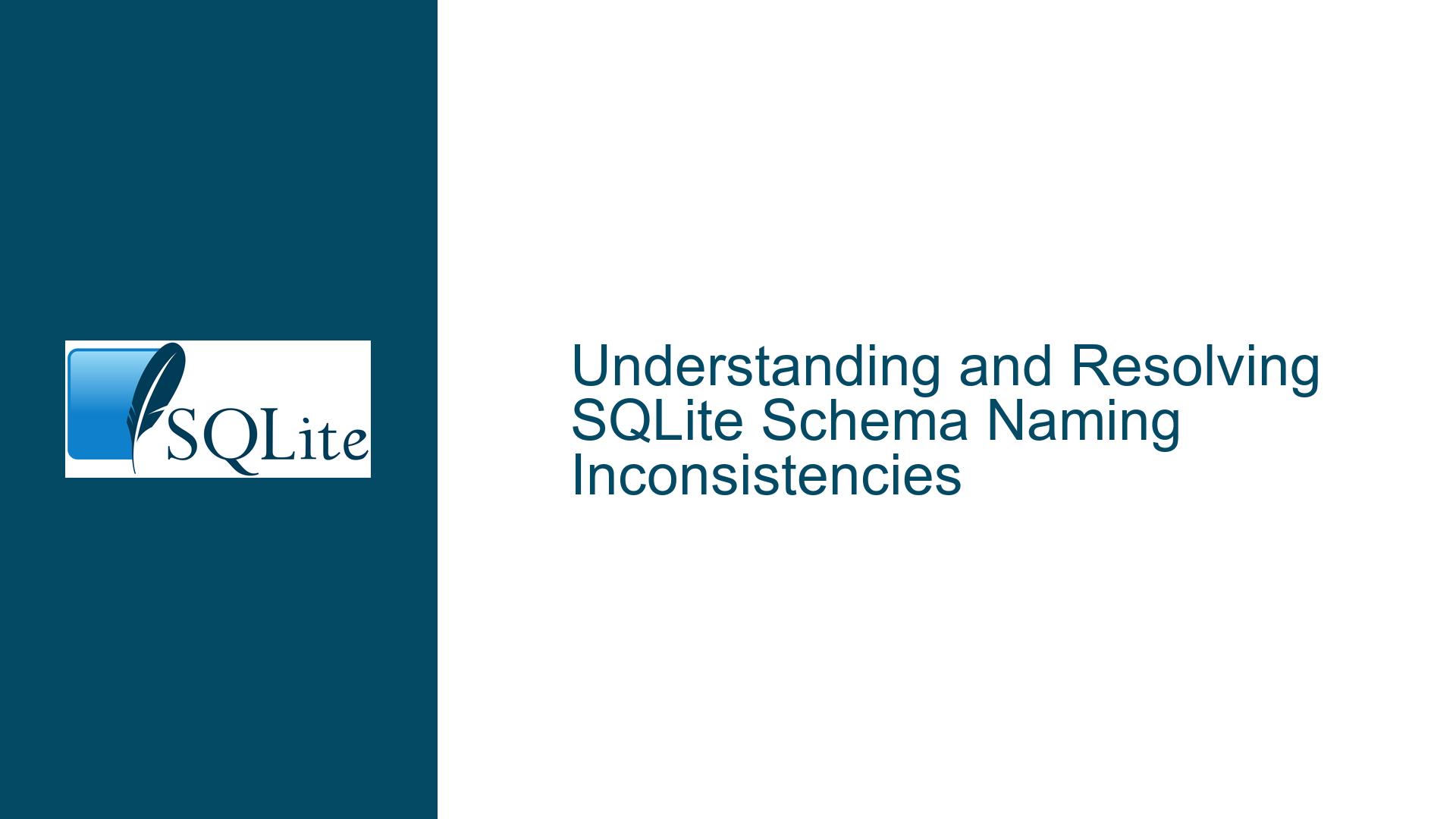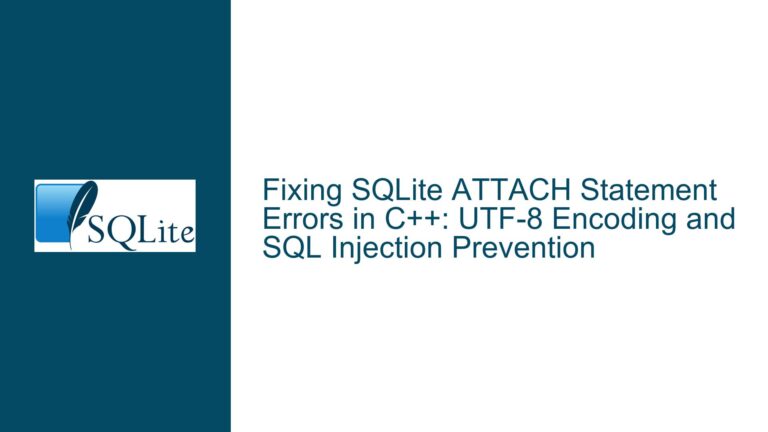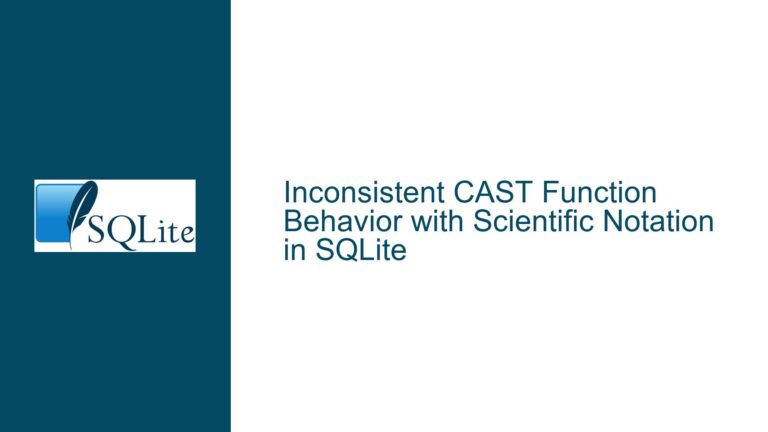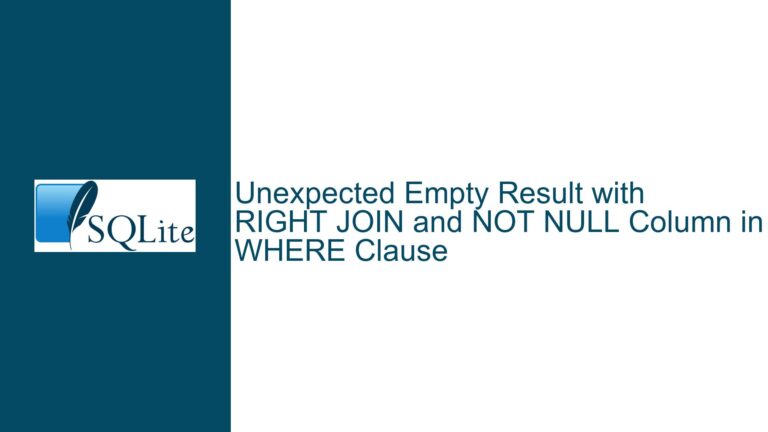and Resolving SQLite Schema Naming Inconsistencies
The Behavior of sqlite_schema vs. sqlite_master in SQLite Queries
SQLite is a lightweight, serverless database engine that is widely used for its simplicity and efficiency. However, like any software, it has its quirks and nuances. One such nuance involves the behavior of the sqlite_schema and sqlite_master tables, which are used to store metadata about the database schema. Specifically, there is an inconsistency in how these tables are treated in SQL queries, particularly when referencing their columns. This issue can lead to confusion and errors, especially for developers who are unaware of the underlying behavior.
The core of the problem lies in the fact that while sqlite_schema is the newer, more descriptive name for the schema table, it is not fully integrated into SQLite’s query parsing and execution engine. This results in situations where queries referencing sqlite_schema fail unless an explicit AS clause is used, whereas queries referencing sqlite_master work as expected. This inconsistency can be particularly problematic when migrating applications or writing queries that need to be compatible across different versions of SQLite.
The Origin of Column Names in Query Results
When executing a query against the sqlite_schema table, the column names in the result set are derived from sqlite_master, not sqlite_schema. This behavior is evident when examining the column origins in the result set. For example, if you execute a query like SELECT * FROM sqlite_schema, the column origins will be listed as sqlite_master.type, sqlite_master.name, and so on, rather than sqlite_schema.type or sqlite_schema.name.
This behavior is not just a superficial naming issue; it has implications for how queries are parsed and executed. The SQLite engine internally maps sqlite_schema to sqlite_master, but this mapping is not fully transparent to the user. As a result, queries that reference sqlite_schema directly may fail unless the AS clause is used to explicitly alias the table. This can lead to confusion, especially for developers who are not familiar with the internal workings of SQLite.
Compatibility Concerns and Potential Solutions
The inconsistency between sqlite_schema and sqlite_master raises compatibility concerns, particularly for applications that rely on specific query patterns. For example, if an application uses a query like SELECT sqlite_master.name FROM sqlite_schema, it may break if the behavior of sqlite_schema changes in future versions of SQLite. Similarly, applications that use the AS clause to work around this issue may find that their queries become redundant if the behavior is eventually fixed.
One potential solution is to fully integrate sqlite_schema into SQLite’s query parsing and execution engine, making it a first-class citizen alongside sqlite_master. This would involve updating the internal mapping logic to ensure that queries referencing sqlite_schema are treated the same as those referencing sqlite_master. This change would not only resolve the current inconsistency but also make SQLite more intuitive for developers who prefer to use the more descriptive sqlite_schema name.
Another approach is to maintain the current behavior but document it more clearly, ensuring that developers are aware of the need to use the AS clause when referencing sqlite_schema. This would involve updating the SQLite documentation to explicitly state that sqlite_schema is an alias for sqlite_master and that queries referencing sqlite_schema may require additional syntax to work correctly.
Troubleshooting Steps, Solutions & Fixes
To address the issues arising from the inconsistent behavior of sqlite_schema and sqlite_master, developers can take several steps to ensure their queries work as expected. First, when writing queries that reference the schema table, it is advisable to use sqlite_master instead of sqlite_schema. This avoids the need for the AS clause and ensures compatibility across different versions of SQLite.
If you prefer to use sqlite_schema for its more descriptive name, you can use the AS clause to explicitly alias the table. For example, instead of writing SELECT sqlite_schema.name FROM sqlite_schema, you can write SELECT s.name FROM sqlite_schema AS s. This approach ensures that the query is parsed correctly and avoids the "no such column" error.
For applications that need to be compatible with both sqlite_schema and sqlite_master, you can implement a conditional logic that checks the SQLite version and adjusts the query accordingly. This can be done using a simple conditional statement in your application code, or by using a prepared statement that dynamically constructs the query based on the SQLite version.
In cases where you are working with existing code that uses sqlite_schema without the AS clause, you can refactor the code to use sqlite_master or add the AS clause as needed. This may involve updating multiple queries, but it will ensure that your application remains compatible with future versions of SQLite.
Finally, if you encounter issues with column origins in query results, you can use the PRAGMA table_info command to inspect the structure of the sqlite_schema table and verify the column names. This can help you identify any discrepancies and adjust your queries accordingly.
In conclusion, while the behavior of sqlite_schema and sqlite_master in SQLite can be confusing, understanding the underlying issues and taking the appropriate steps can help you avoid common pitfalls and ensure that your queries work as expected. By using sqlite_master or the AS clause, implementing conditional logic, and inspecting table structures, you can navigate these inconsistencies and maintain compatibility across different versions of SQLite.






